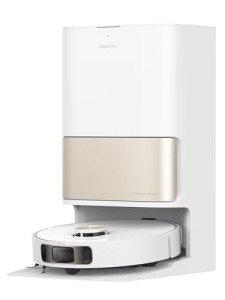Robotic Vacuum Cleaner Comparison: The Future of Home Cleaning
In recent years, robotic vacuum cleaners have actually transformed the method we keep tidiness in our homes. With developments in technology and the incorporation of expert system, these gadgets have progressed from mere novelty items to essential home appliances. This post provides a comprehensive comparison of some of the leading robotic vacuum on the marketplace, assisting customers make informed choices when selecting a design that matches their requirements.
Comprehending Robotic Vacuum Cleaners
Robotic vacuum are autonomous machines created to clean floors instantly. Equipped with best robot vacuum under 200 , they navigate around challenges and adjust their cleaning routes for maximum efficiency. The crucial functions that differentiate different designs include suction power, battery life, app connectivity, navigation technology, and price.
Key Features to Consider
When comparing robotic vacuum cleaners, potential buyers must take into consideration the following factors:
- Suction Power: Measured in Pascals (Pa), suction power determines the efficiency of getting dirt and debris.
- Battery Life: The length of time a vacuum can operate before requiring a recharge significantly impacts its cleaning performance.
- Navigation Technology: Models may use easy random navigation or innovative mapping technologies (like LIDAR) that allow them to develop a map of the home.
- Smart Features: Connectivity to mobile phone apps or smart home systems can improve functionality and control.
- Filter Type: HEPA filters are recommended for allergic reaction patients, as they trap irritants and improve air quality.
Comparison of Top Robotic Vacuum Cleaners
Below is a comparison table of some of the best robotic vacuum cleaners readily available in 2023:
| Model | Suction Power (Pa) | Battery Life (minutes) | Navigation Technology | Smart Features | Price (GBP) |
|---|---|---|---|---|---|
| iRobot Roomba i7+ | 1700 | 75 | Smart mapping | App control, voice command | ₤ 949 |
| Roborock S7 | 2500 | 180 | LIDAR | App control, multi-floor | ₤ 649 |
| Neato D7 | 2000 | 120 | LIDAR | App control, zone cleaning | ₤ 599 |
| Ecovacs Deebot T10 | 3000 | 150 | Smart mapping | App control, room detection | ₤ 799 |
| Shark IQ Robot | 1200 | 90 | Random | App control, self-emptying | ₤ 399 |
Explanation of the Table
- iRobot Roomba i7+: Known for its robust cleaning ability, it features smart mapping technology that allows it to designate specific areas for cleaning. Its self-emptying function is a plus for benefit.
- Roborock S7: This design excels in suction power and battery life, making it ideal for bigger homes. Its LIDAR innovation assists develop an effective cleaning course, and it can vacuum and mop at the same time.
- Neato D7: The D-shape design enables for much better corner cleaning, and it features strong suction power. Its LIDAR navigation allows it to map out cleaning locations precisely.
- Ecovacs Deebot T10: Boasting the highest suction power and advanced navigation, this model can manage several floors effectively. It's a flexible choice for households with differing floor types.
- Shark IQ Robot: An affordable choice that still provides smart functions. Its self-emptying ability and app integration make it a useful choice for those trying to find a strong cleaning companion without breaking the bank.
Benefits of Robotic Vacuum Cleaners
Robotic vacuum provide numerous benefits that contribute to their increasing appeal amongst consumers:
- Time-Saving: Automated cleaning allows users to release up valuable time that can be invested on other activities.
- Convenience: Many designs can be scheduled through apps to clean at specific times, decreasing manual effort.
- Accessibility: They can reach under furnishings and in tight areas where conventional vacuums might have a hard time.
- Daily Maintenance: Regular usage of robotic vacuums can help preserve a regularly clean environment, promoting much better total home health.
Frequently Asked Questions About Robotic Vacuum Cleaners
1. How often should I run my robotic vacuum?
It is suggested to run the robotic vacuum at least 2-3 times a week to keep tidiness, though daily use can be useful, particularly in homes with animals or high foot traffic.
2. Do robotic vacuums work on carpets?
Yes, many robotic vacuums are created to work on carpets, however effectiveness may differ based upon the model's suction power and brush type. Try to find designs specifically pointed out as reliable for carpets.
3. Can robotic vacuums clean family pet hair?
Most robotic vacuums can effectively pick up pet hair, but those with strong suction and tangle-free brush designs are particularly appropriate for this job.
4. How do I maintain my robotic vacuum?
Regular maintenance consists of cleaning the brushes and sensing units, emptying the dustbin, and periodically changing filters to make sure ideal efficiency.
5. Are robotic vacuums worth the financial investment?
While they tend to be more costly than traditional vacuums, the benefit, performance, and time-saving aspects make them a worthwhile financial investment for lots of households.
The market for robotic vacuum cleaners continues to expand as technology evolves, providing consumers a range of alternatives to match various cleaning requirements and budgets. By carefully thinking about features such as suction power, battery life, and smart abilities, users can choose a design that lines up with their way of life. Whether for benefit, ease of use, or superior cleaning performance, robotic vacuums are unquestionably reshaping the future of home cleaning.

